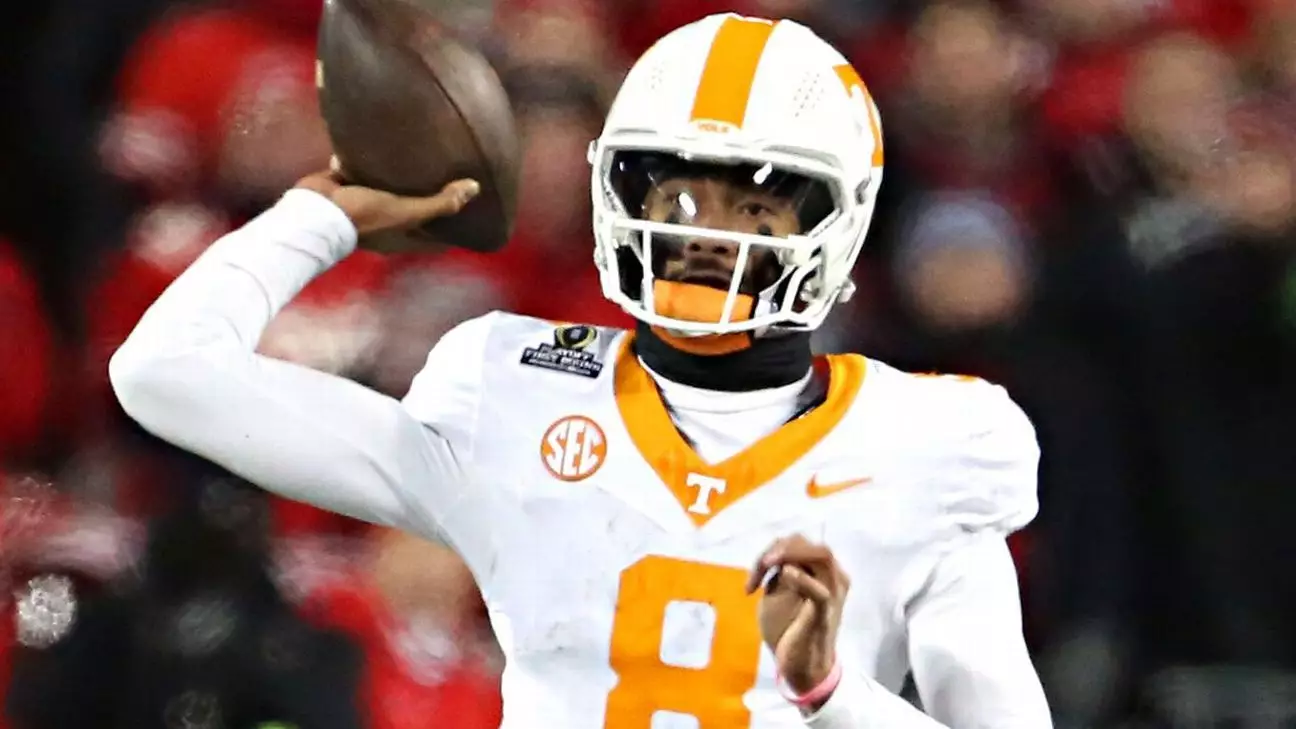In the often tumultuous realm of college football, serious questions arise as the pursuit of talent becomes clouded by commercial interests. The case of Nico Iamaleava’s potential transfer from Tennessee to UCLA exemplifies this troubling trend. It isn’t merely about a star quarterback relocating—it symbolizes a troubling junction where raw athleticism meets commodification. When we evaluate Iamaleava’s journey, we see a highly sought-after talent, but we must also confront the uncomfortable truth that the admiration for these athletes frequently pales in comparison to the monetary expectations attached to them.
The reports that Iamaleava is on the brink of transferring—coupled with his demands of at least $4 million—reflect a sporting ecosystem increasingly distorted by lucrative contracts and endorsements. To many outsiders, Iamaleava is a beacon of hope for UCLA, potentially invigorating a program that finished a mere 5-7 in its previous season. For fans, the excitement around his transfer is palpable, but it should also raise caution. What does it say about our priorities as a society, where even young athletes at the college level are weighed against dollar signs?
The Player or the Brand?
Iamaleava’s predicament emphasizes a broader issue in college sports: the transition from player to brand. The quarterback, who collectively led Tennessee to the College Football Playoff, is not just a player; he’s an asset that promises to deliver financial returns through ticket sales, merchandising, and increased media exposure. Yet, we must ask ourselves: are we honoring the sport, or merely the economic value of it?
The prospect of Iamaleava joining UCLA raises excitement levels, yet his departure from Tennessee has not been altogether amicable. Footage of coach Josh Heupel discussing the situation, underscoring that “there’s no one bigger than the Power T,” paints a picture of a school whose pride is intertwined with its football heritage. In this light, Iamaleava is more than a quarterback; he becomes a bargaining chip in the grander game of collegiate athletics, where loyalty and commitment are often cast aside in favor of financial gain.
The Ripple Effects of High-Stakes Moves
The implications of such an unprecedented move will reverberate through the sports community. While UCLA stands to gain a formidable player, they must also grapple with the fallout of restructuring their financial framework to accommodate him. The pressure mounts not just on the coaching staff but also on existing players. Just how does the arrival of a high-profile recruit impact team dynamics fractured by financial incentives?
Moreover, the ripple effect extends beyond the immediate rosters at play. It sets a precedent where future recruits might feel compelled to gauge their worth based on the offered financial packages rather than the traditional metrics of growth and development as athletes. It breeds a culture where the sporting journey becomes secondary to an athlete’s ability to extract maximum revenue from their talents.
The Illusion of Progress and Its Perils
In many ways, we are at a crossroads in college football. As UCLA positions itself as a plausible contender for Iamaleava’s services, one cannot help but question the long-term ramifications of such financial negotiations. Is it a step forward for recruitment, or merely an elaborate smoke-and-mirrors game where the illusion of progress conceals systemic imperfections?
The discussions around Iamaleava’s potential arrival symbolize not only UCLA’s aspiration but also the NCAA’s complicity in redefining collegiate sports as a business-first framework. The organization is at risk of losing sight of its foundational principle: nurturing young talents, both on the field and beyond it. If athletes like Iamaleava are perpetually motivated by financial prospects, the integrity of the game might suffer as a casualty of commercial ambition.
In this era where every aspect of an athlete is scrutinized for economic potential rather than personal growth, the purity of college football seems increasingly at stake. As fans, coaches, and players engage in this heated drama, we must contemplate the road ahead and whether the excitement of high-stakes transfers ultimately leads us forward or deeper into a quagmire fueled by money.


Leave a Reply